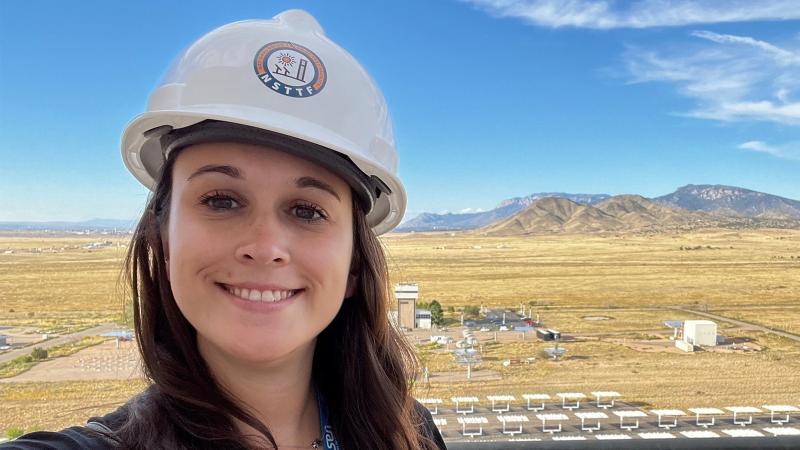Emily de Stefanis will study more sustainable ways to cool nuclear reactors
January 23, 2024

Rensselaer Polytechnic Institute doctoral student Emily de Stefanis is one of 60 recipients of the U.S. Department of Energy (DOE) Office of Science Graduate Student Research (SCGSR) award. The SCGSR program places students with mentors at DOE national labs, where students learn from top experts in their field and conduct research in state-of-the-art facilities.
De Stefanis will spend 2024 at the Los Alamos National Laboratory in New Mexico working on her research with experts in the field of nuclear materials.
De Stefanis, who is pursuing a doctorate in mechanical engineering, is a great example of the way RPI students are free to explore many disciplines and blend their passions, said Emily Liu, Ph.D., head of Rensselaer’s Industrial and Systems Engineering Department and a professor of mechanical, aerospace, and nuclear Engineering.
“In spring 2019, after one of my research talks, Emily came up to me to express her interest in combining mechanical engineering and her background in chemistry. I’m so proud of what she has been able to accomplish since then, and this award is well deserved,” said Liu, who is de Stefanis’ doctoral adviser.
At Los Alamos National Laboratory, de Stefanis will use computer simulations to study the behavior of molten salt systems with fuel for molten salt nuclear reactors.
“When most people think of salts, they probably think of table salt, sodium chloride, that is used to flavor food. Outside of the kitchen, salts are used as a material in numerous applications, including as a heat transfer fluid. Salts are crystals at room temperature, but at several hundred degrees Celsius, they melt. In their molten form, salts absorb and transfer heat very well, making them especially useful in industrial processes and power generation,” de Stefanis explained.
Doing this research at Los Alamos under the direction of Ping Yang, Ph.D., deputy director of the G.T. Seaborg Institute for Transactinium Science, will be invaluable for her doctoral work and future career, de Stefanis said.
“I’m excited to explore all the mentorship opportunities and professional connections I’ll make at the lab, as well having access to the nuclear science resources there,” de Stefanis said.
“Los Alamos is an intellectually exciting place. I am pleased that Emily will have a chance to work with outstanding scientists at the intersections of disciplines to tackle challenging problems in the field of sustainable energy,” said Shekhar Garde, Ph.D., dean of Rensselaer’s School of Engineering. “This opportunity is also a part of growing collaboration between RPI and National Labs, through faculty and student exchanges and visits to work on cutting-edge research problems.”
De Stefanis is one of two students from RPI who received a 2023 SCGSR award. This month, Lucas Bowman Sutton will head to the Oak Ridge National Laboratory to conduct research on the circadian clock.
“RPI is so pleased to have two students accepted to this highly competitive program. Lucas and Emily are outstanding representatives for Rensselaer and the way we prepare graduate students to solve global challenges,” said Dorit Nevo, Ph.D., acting dean of Rensselaer’s Office of Graduate Education.
The RPI Office of Graduate Education has seen an increase in students receiving nationally competitive fellowships and offers advising resources for students applying to these opportunities. For more information, contact Betty Madigan, fellowship advisor, at madige@rpi.edu.